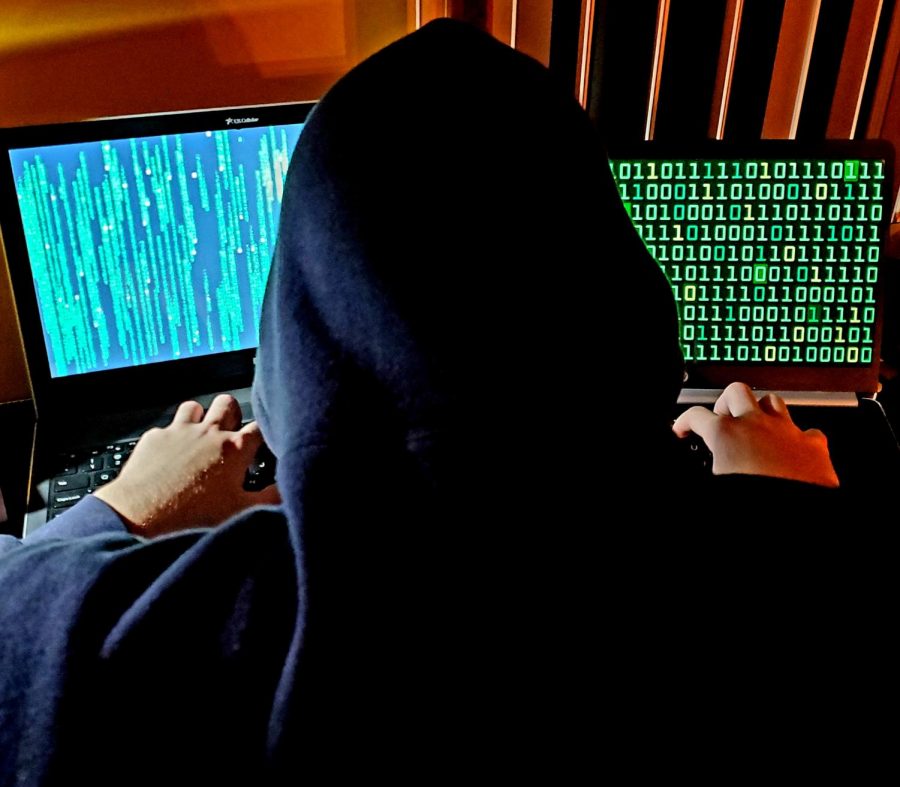Threat behind the screen
Why knowing how to protect yourself from cyber attacks is important
Photo by Sasha Kek
Cybercrime increased by six counts this year, according to PurpleSec statistics, which is why students need to be aware of any malicious activity they see online. “I get a lot of Instagram DMs that have random links in them,” Julia Cison, senior who was hacked on Instagram, said. “I’ll never go into them or look at them anymore because that’s what I think started when I got hacked. Maybe I clicked on a link or something that someone sent me, so I just pay attention to what I do on my phone to make sure it doesn’t happen again.”
Cyber attacks are online criminal acts intending to harm one’s identity through a series of malicious attacks on that person’s device for personal information.
Cybercrime has increased 600% this year, according to PurpleSec, a cybersecurity company that specializes in online safety, leading to a potential $6 trillion to remedy stolen identities and/or financial information. With cyber-attacks happening approximately every 38 seconds, students need to be aware of their online activity in order to prevent the possibility of being cyber attacked.
Julia Cison, senior, is one student who has experienced a cyber attack when her Instagram account was hacked last year.
“I went onto Instagram and then all of a sudden all my posts were deleted [and] my random archive posts were on my main page,” Cison said about her experience. “All of my favorite pictures were deleted from everything [and] I got logged out of my Instagram account later that day.”
After changing her password four times, Cison was able to resolve the issue, although she lost her favorite photos that were deleted from her account forever.
“I freaked out right away and tried to make three new accounts, so I have three random accounts now,” Cison said. “It was really unnecessary when I freaked out because I lost my Instagram. I was like, ‘Oh my god, oh my god, oh my god.’”
But Cison is not alone. In fact, 24.5% of students at the high school report to have experienced a cyber attack, according to a Bear Facts survey of 294 students, which is why it is important for students to know how to be safe online, according to district safety coordinator Danielle Stevens.
“[In order to stay safe online], things like having two-step authentication on your personal accounts can help prevent a cyberattack, [and] creating strong and unique passwords that are not the same for every account,” recommends Stevens, who is in charge of working with school staff and security to regulate safety throughout the school day. “It is always recommended that you do not save financial information on shopping sites like Amazon, [and] I always recommend using credit cards when shopping online because if there’s something that you review on your statement and you need to dispute, you could take that action to the credit card company, whereas if it’s a debit card, you can dispute it, but that charge may have processed.”
While it is important to know how to protect yourself online, identifying signs of malicious activity is also important in order to be prepared for such attacks, according to Stevens.
“When you are on different sites, one thing to remember is nothing is ever free,” Stevens said. “If you’re going to sites where they’re offering free movies or something else that’s free, you want to make sure you’re on a secure website; you’re looking for the ‘https’ for a secure website. Another thing to keep in mind is if you’re using free WiFi, you have to deal with entering personal information; you are on an open network, so you have to be cautious when using free WiFi.”
Sometimes knowing how to stay safe is not enough to prevent attacks, which is why the school has resources to help resolve possible attacks. Stevens says “we would work with our IT team [and] Mark Frye – he’s our school resource officer from Lake Zurich Police Department” to resolve the issue.
“There may be two things going on at the same time [when a student is cyber attacked]: the school district would be doing everything possible to support the student [who was cyber attacked], but then we also may be looking at if there is any kind of criminal element to what’s going on here,” Stevens said. “We would want to make sure that if [the student needed] any kind of counseling services were needed, we could refer the student to someone, and we would work through ways to ensure that something like this does not happen again.”
After her experience, Cison says to “not freak out and make an Instagram five seconds later” if student gets hacked on Instagram as this may make the situation worse, she said, because each account Cison made ultimately received more attacks.
“Don’t freak out that you don’t have [an Instagram],” Cison said. “I would say just see if you can go through Instagram and email the company to see if they can do anything or tell you what happened, [and] take a month off social media.”
Both Stevens and Cison say that students should be cautious in the cyberworld as cybercrime is on the rise every year, according to PurpleSec statistics, increasing one’s risk.
“I think that as technology advances, we will continue to see an increase in financial and cybercrime, and that in part is why here in the district, we have a whole team of IT professionals working for our district,” Stevens said. “Never feel like you are going to get in trouble [if you are cyber attacked]; it’s always great to take advantage of all the support systems we offer here at the district.”

This is Sasha’s third and final year working with the Bear Facts staff as the LZ Life Editor. Aside from helping Bear Facts run smoothly, you can find...

